Understanding Central Air Conditioner Repair
Central air conditioners are essential for maintaining indoor comfort, especially during hot summers. However, like any mechanical system, they can develop issues that require timely repairs. Identifying and addressing these problems promptly can prevent costly breakdowns and extend the lifespan of your HVAC system. Below, we will discuss common issues that necessitate central air conditioner repair.
Common Issues That Require Repair
Refrigerant Leaks
Refrigerant is the substance responsible for absorbing heat and cooling the air inside your home. When a refrigerant leak occurs, your AC unit loses its cooling efficiency, making it struggle to maintain the desired temperature.
Signs of a Refrigerant Leak:
- Weak or warm airflow from vents
- Hissing or bubbling noises near the AC unit
- Ice buildup on refrigerant lines or coils
- Increased energy bills due to system overwork
How to Fix a Refrigerant Leak:
If you suspect a refrigerant leak, it is crucial to call a professional HVAC technician. They will locate the leak, repair the damaged area, and recharge the system with the correct refrigerant levels. It is important to note that low refrigerant levels are not a normal occurrence; they indicate a leak that needs professional attention.
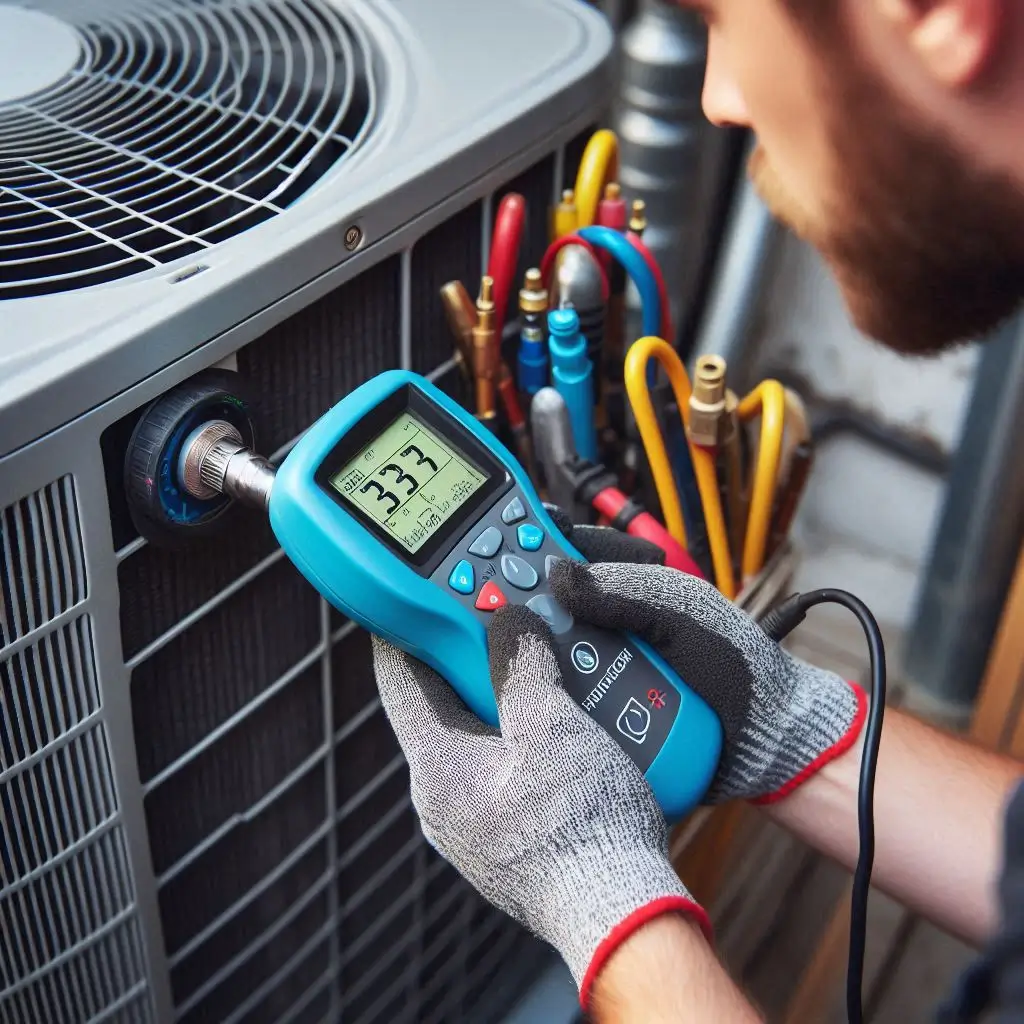
Frozen Evaporator Coils
The evaporator coil is responsible for absorbing heat from the air inside your home. If the coil becomes too cold, it can freeze, leading to airflow restrictions and reduced cooling efficiency.
Causes of Frozen Evaporator Coils:
- Dirty Air Filters: Clogged filters restrict airflow, preventing warm air from reaching the coils.
- Low Refrigerant Levels: A refrigerant leak can cause pressure imbalances, leading to freezing.
- Blocked Vents or Ducts: Obstructed air circulation can trigger coil freezing.
How to Fix Frozen Coils:
- Turn off the AC to allow the ice to melt.
- Check and replace dirty air filters.
- Inspect vents and ducts for obstructions.
- If freezing persists, call a professional to inspect the refrigerant levels and system airflow.
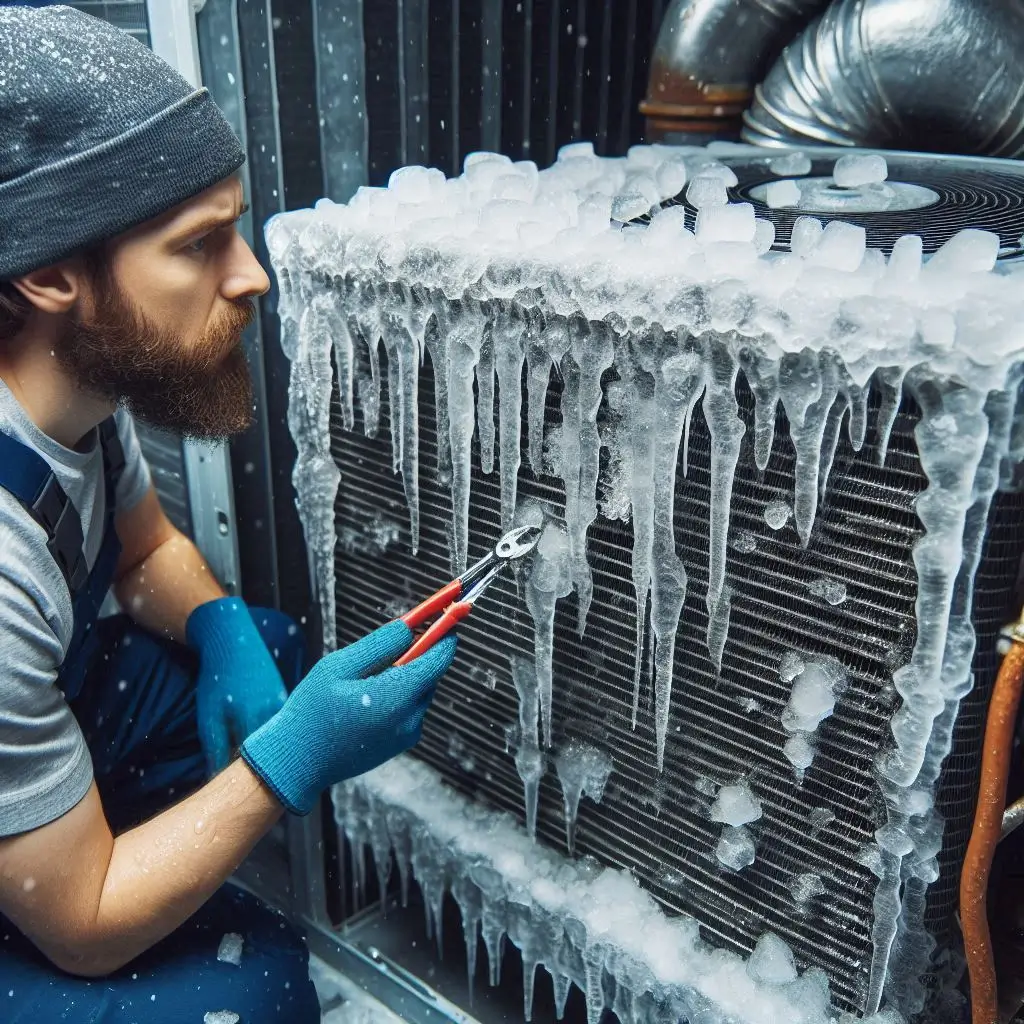
Electrical Control Failures
The electrical system in your air conditioner controls the compressor, fan, and thermostat functions. Over time, frequent cycling of the AC can cause electrical connections and components to wear out, leading to malfunctions.
Signs of Electrical Control Failures:
- AC unit frequently turning on and off (short cycling)
- Fan or compressor failing to start
- Burning smell near the AC unit
- Flickering or inconsistent cooling performance
How to Fix Electrical Issues:
- Inspect circuit breakers and fuses for tripped switches.
- Ensure thermostat wiring is intact and functioning.
- Call a certified technician to diagnose and repair damaged electrical components, such as contactors or capacitors.
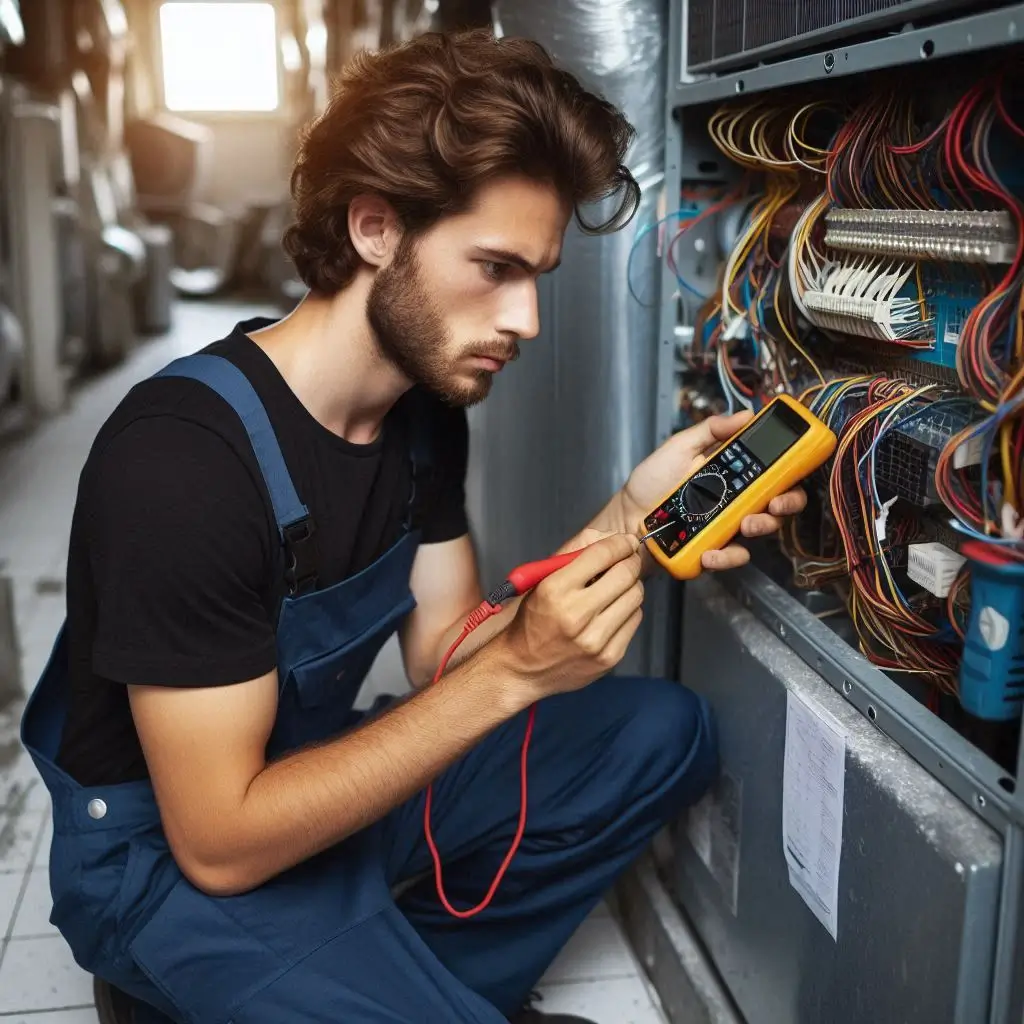
Thermostat Malfunctions
A faulty thermostat can prevent your air conditioner from functioning properly, leading to inconsistent temperatures or an unresponsive system.
Signs of a Malfunctioning Thermostat:
- AC not turning on or off as scheduled
- Incorrect temperature readings
- Unresponsive thermostat controls
- Sudden temperature fluctuations
How to Fix Thermostat Issues:
- Replace old batteries in battery-powered thermostats.
- Check thermostat settings to ensure they match the desired temperature.
- If issues persist, consider upgrading to a programmable or smart thermostat for improved efficiency.
- Contact an HVAC professional for wiring or sensor repairs.
Signs Your Central Air Conditioner Needs Repair
A central air conditioner is essential for maintaining a comfortable indoor environment, especially in hot and humid climates. However, over time, your AC unit may develop issues that indicate it needs professional repair. Ignoring these warning signs can lead to more costly repairs or even a complete system breakdown. Below, we will explore the key indicators that your central air conditioner requires immediate attention.
Unusual Noises and Strange Odors
Your air conditioner should operate smoothly with minimal noise. If you start hearing unusual sounds or detecting strange odors, this is often a sign of underlying problems.
Common Unusual Noises and Their Causes:
- Grinding or Screeching Sounds: Worn-out motor bearings or belt issues.
- Banging or Clanking: Loose or broken components inside the AC unit.
- Clicking Sounds: Faulty electrical connections or a failing thermostat.
- Hissing or Bubbling: Refrigerant leaks that require professional attention.
Common Odors and Their Causes:
- Burning Smell: Overheated electrical components or motor failure.
- Musty or Moldy Odor: Excess moisture in ducts or clogged drain lines leading to mold growth.
- Chemical Smell: Potential refrigerant leaks that can harm indoor air quality.
How to Fix These Issues:
- If you notice any of these sounds or smells, turn off your AC unit and schedule an inspection with an HVAC professional.
- Regular maintenance can help prevent motor and electrical failures.
- Cleaning or replacing air filters can eliminate musty odors and improve airflow.
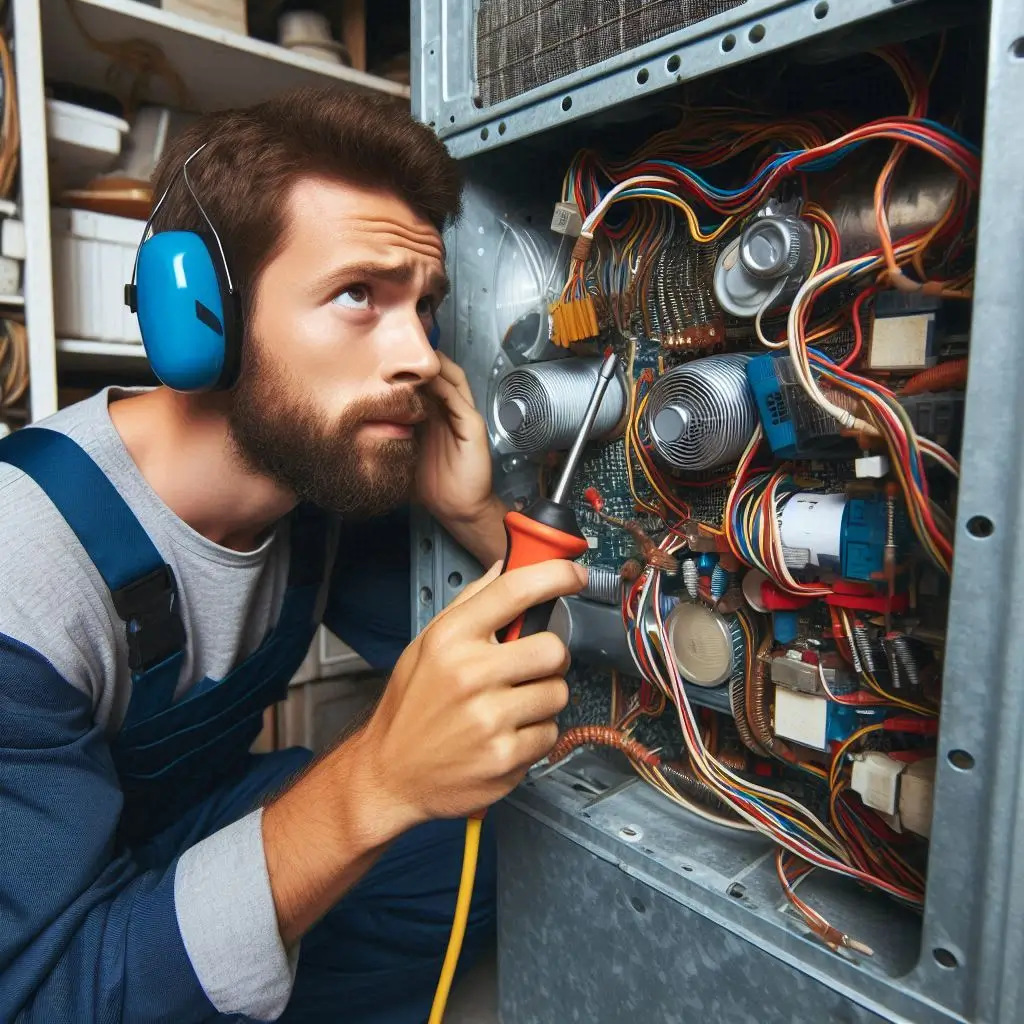
Weak Airflow or Uneven Cooling
If certain rooms in your home feel warmer than others, or if the airflow from your vents is weak, your central air conditioner may not be functioning efficiently.
Causes of Weak Airflow and Uneven Cooling:
- Clogged Air Filters: Dirty filters restrict airflow, reducing cooling efficiency.
- Blocked or Leaky Ducts: Dust buildup or duct leaks can prevent air from reaching certain rooms.
- Failing Blower Motor: A malfunctioning blower motor results in poor airflow.
- Low Refrigerant Levels: Without enough refrigerant, your AC cannot properly cool your home.
How to Improve Airflow and Cooling Efficiency:
- Replace air filters regularly to prevent airflow blockages.
- Have your ductwork inspected for leaks or debris buildup.
- Schedule routine maintenance to check for blower motor and refrigerant issues.
- Ensure that vents and registers are not obstructed by furniture or curtains.
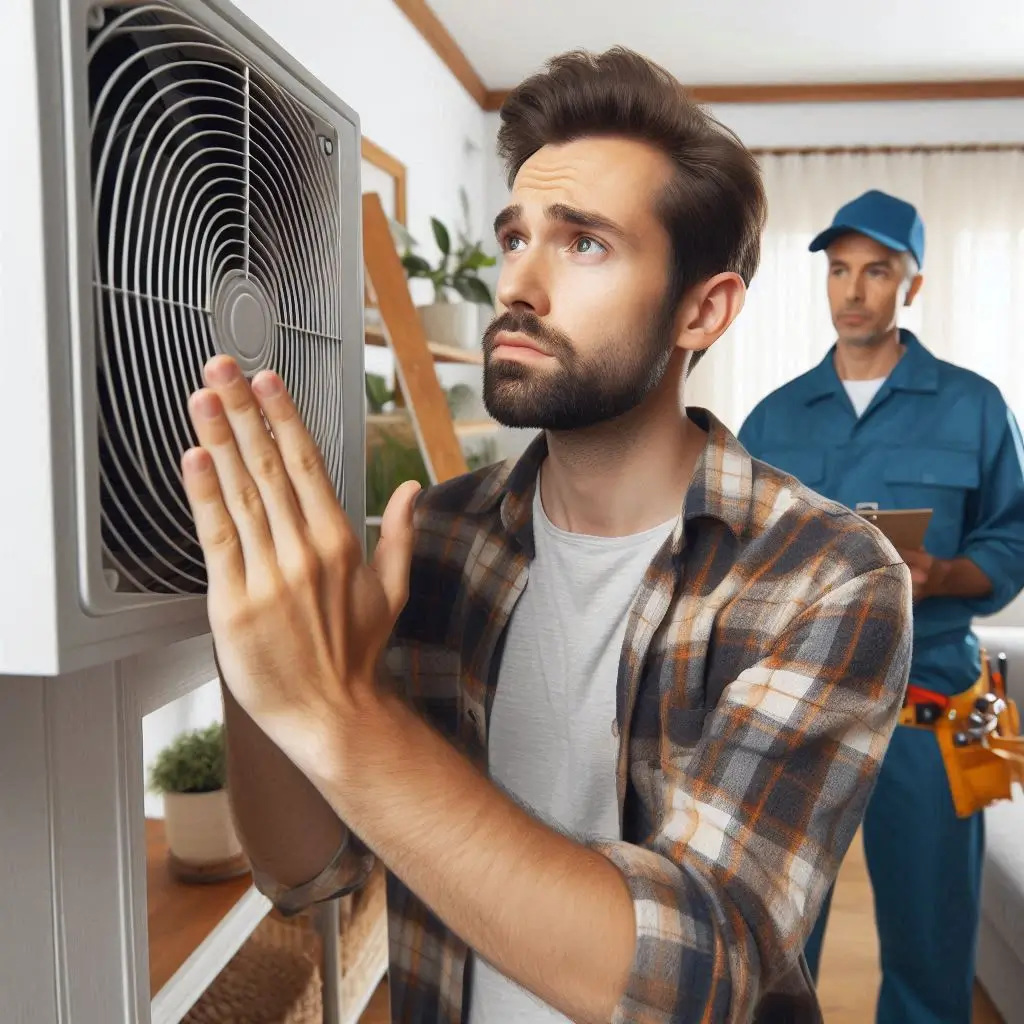
High Energy Bills and Inefficiency
A sudden spike in your energy bills without a corresponding increase in usage is a strong indicator that your central air conditioner is not running efficiently.
Causes of High Energy Bills:
- Aging AC Unit: Older systems lose efficiency over time and require more energy to operate.
- Dirty Coils and Filters: Accumulated dust and dirt force the system to work harder.
- Refrigerant Leaks: Low refrigerant levels cause the AC to overwork, increasing energy consumption.
- Malfunctioning Thermostat: A faulty thermostat can cause the system to run longer than necessary.
How to Reduce Energy Consumption and Improve Efficiency:
- Schedule seasonal AC tune-ups to keep your system running optimally.
- Upgrade to a programmable or smart thermostat for better temperature control.
- Clean or replace air filters every 1-3 months.
- If your AC unit is over 10-15 years old, consider replacing it with an energy-efficient model.
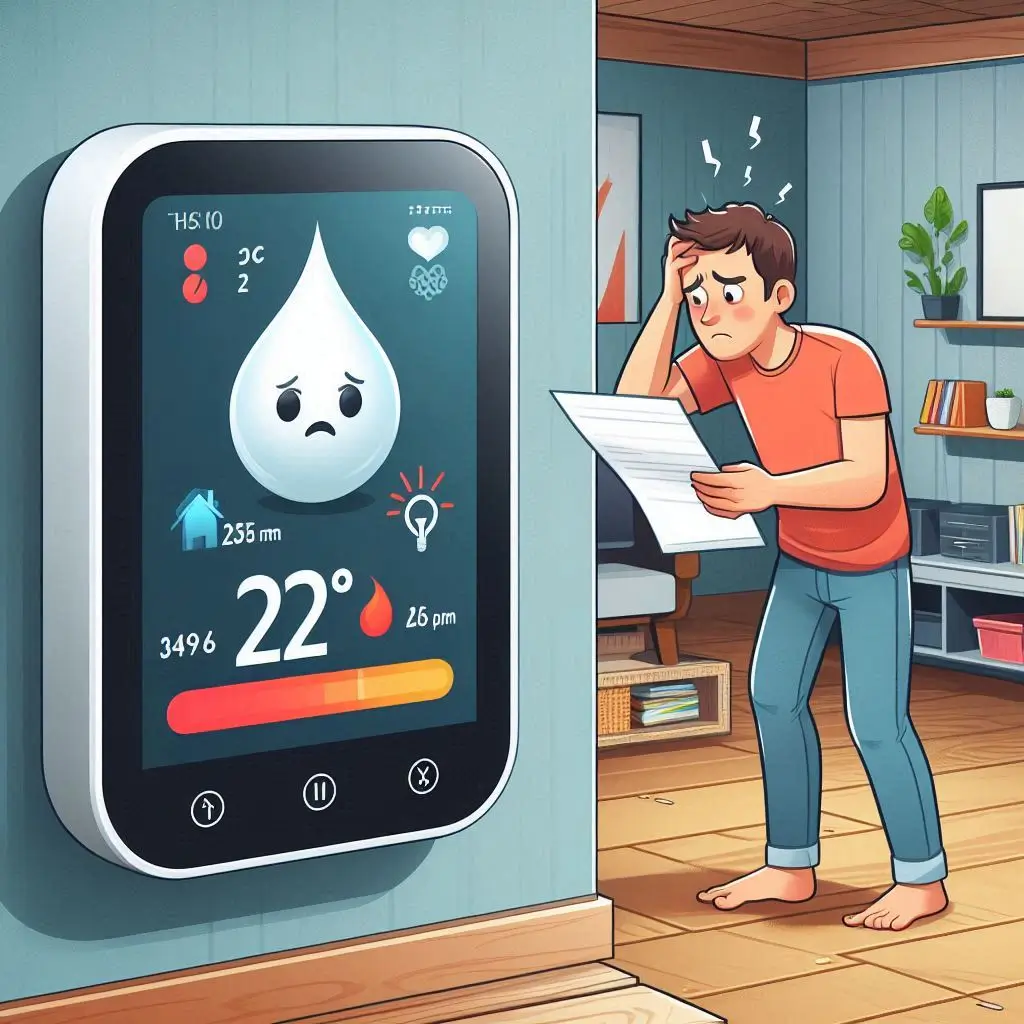
Troubleshooting Central Air Conditioner Problems
A malfunctioning central air conditioner can cause discomfort, especially during hot weather. Fortunately, some common AC problems can be resolved through troubleshooting before calling an HVAC professional. Below, we will discuss three key troubleshooting steps: checking and replacing air filters, inspecting thermostat settings, and cleaning condenser coils.
By following these steps, you can improve your AC’s performance, enhance energy efficiency, and extend its lifespan.
Checking and Replacing Air Filters
One of the most common reasons for AC inefficiency is a clogged or dirty air filter. Air filters trap dust, dirt, and allergens, preventing them from circulating in your home. However, when they become clogged, they restrict airflow and reduce cooling efficiency.
Signs of a Dirty Air Filter:
- Weak airflow from vents
- Increased dust buildup in your home
- Higher energy bills due to the AC overworking
- The AC unit frequently turns on and off (short cycling)
How to Check and Replace an Air Filter:
- Turn Off the AC Unit: Before inspecting the filter, switch off your air conditioner to prevent dust from circulating.
- Locate the Air Filter: It is usually found in the return air duct or inside the indoor unit.
- Remove and Inspect the Filter: Hold it up to the light; if it appears dirty or clogged, it needs to be replaced.
- Replace with a New Filter: Choose a filter that matches the specifications of your AC system. Higher MERV-rated filters offer better filtration but may reduce airflow if your system is not designed for them.
- Replace Every 1-3 Months: Regular replacement ensures optimal airflow and efficiency.
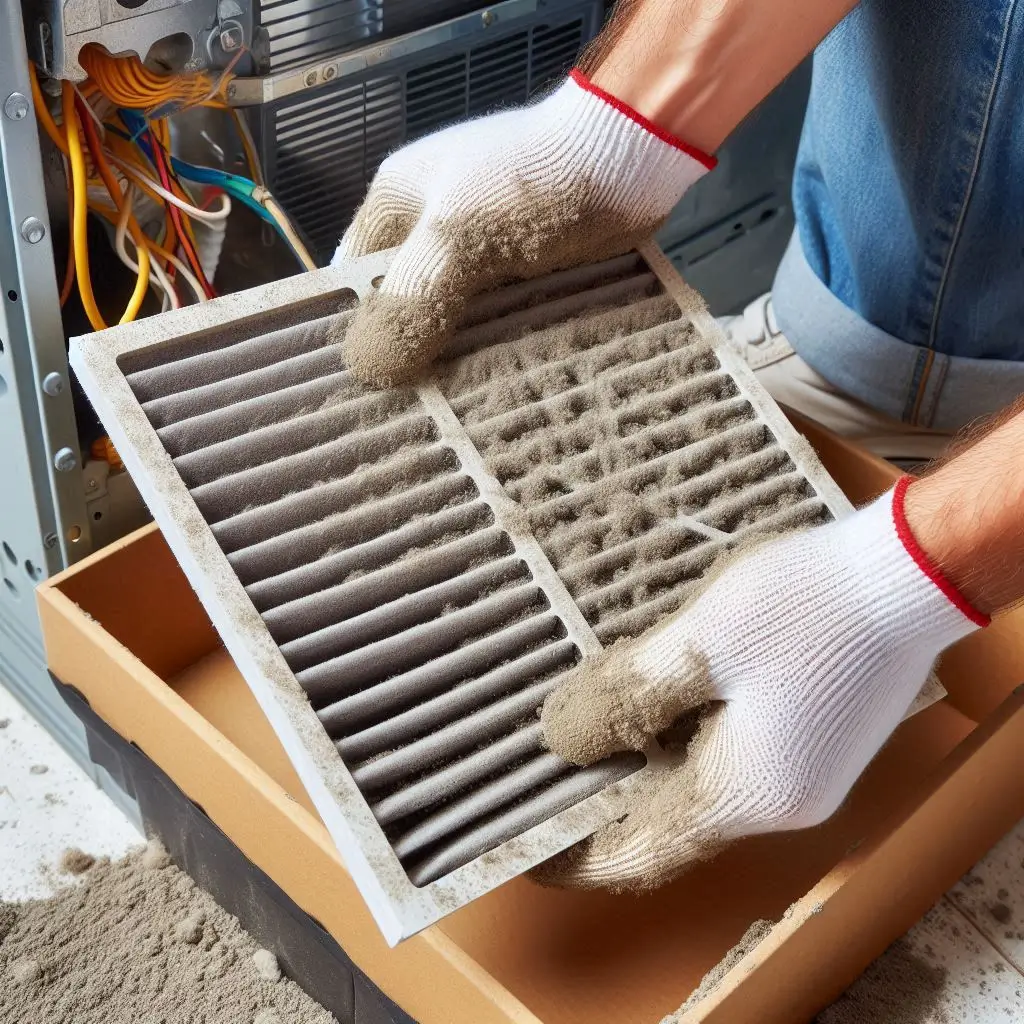
Inspecting the Thermostat Settings
A thermostat controls the temperature of your home by signaling the AC to turn on or off. Incorrect settings or malfunctions can lead to cooling issues.
Common Thermostat Issues and Their Fixes:
- Incorrect Temperature Settings: Ensure that the thermostat is set to “Cool” mode and the temperature is lower than the current room temperature.
- Dead Batteries: If your thermostat is battery-operated, replace the batteries and restart the system.
- Improper Placement: If the thermostat is near heat sources like windows or appliances, it may misread the room temperature. Relocating it to a central area can improve accuracy.
- Faulty Wiring or Sensor Issues: If the display is unresponsive or the AC does not turn on, the thermostat wiring may be faulty. In this case, consult an HVAC professional.
Upgrading to a Smart Thermostat for Efficiency:
If your thermostat is outdated, consider upgrading to a programmable or smart thermostat. These devices allow you to set schedules and optimize cooling efficiency, reducing energy costs.
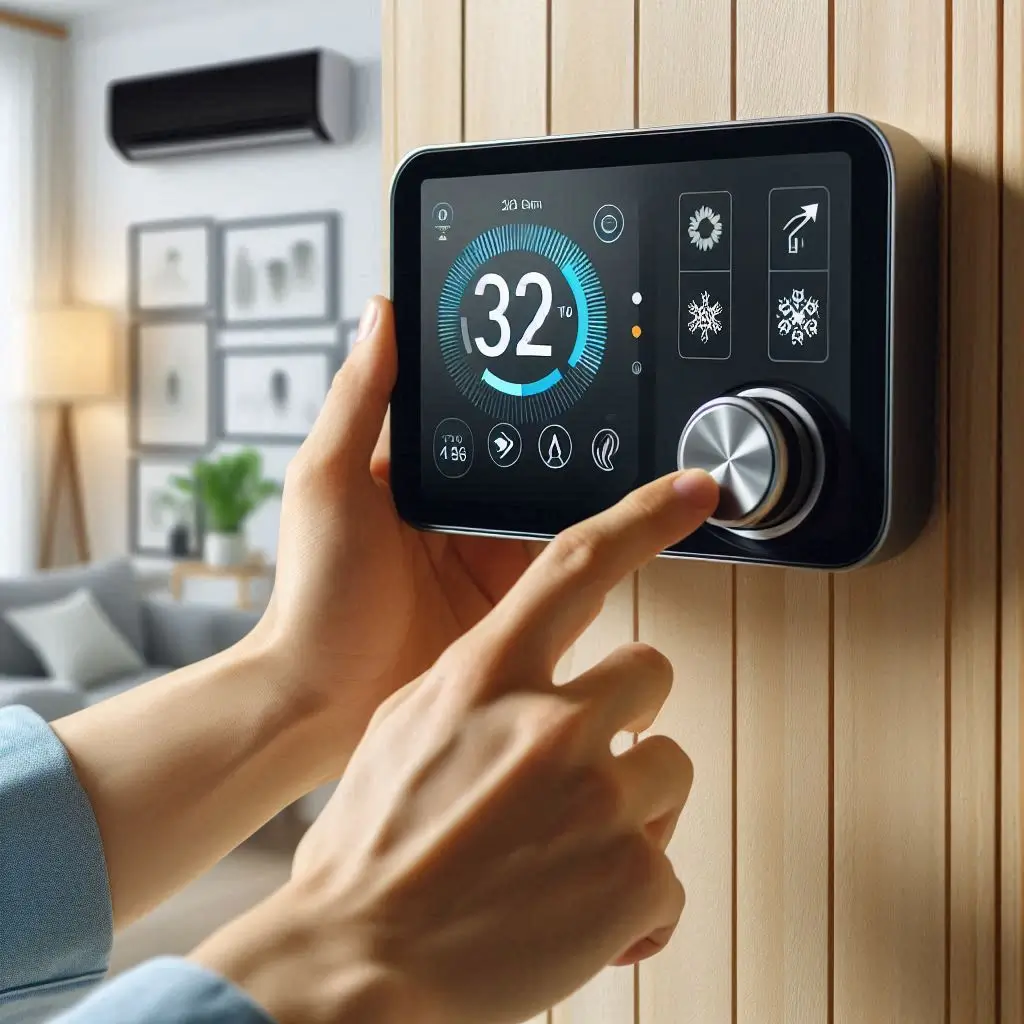
Cleaning the Condenser Coils
The condenser coils, located in the outdoor AC unit, play a crucial role in heat dissipation. Over time, dirt, debris, and leaves can accumulate on the coils, reducing efficiency and causing the system to overheat.
Steps to Clean the Condenser Coils:
- Turn Off Power to the AC Unit: Safety first—switch off the unit at the breaker box before cleaning.
- Remove Debris: Clear away leaves, grass, and dirt from around the outdoor unit.
- Use a Soft Brush or Vacuum: Gently brush off dust from the coils using a coil brush or a vacuum with a soft brush attachment.
- Apply Coil Cleaner: Use a commercially available coil cleaner, following the manufacturer’s instructions. Let it sit for a few minutes to break down dirt.
- Rinse with Water: Use a low-pressure garden hose to wash away the cleaner and dirt. Avoid using high pressure, as it may damage the coils.
- Allow to Dry and Restart the Unit: Once dry, turn the power back on and monitor performance.
Benefits of Cleaning the Condenser Coils:
- Improves energy efficiency and cooling performance
- Reduces strain on the compressor, extending its lifespan
- Prevents overheating and costly repairs
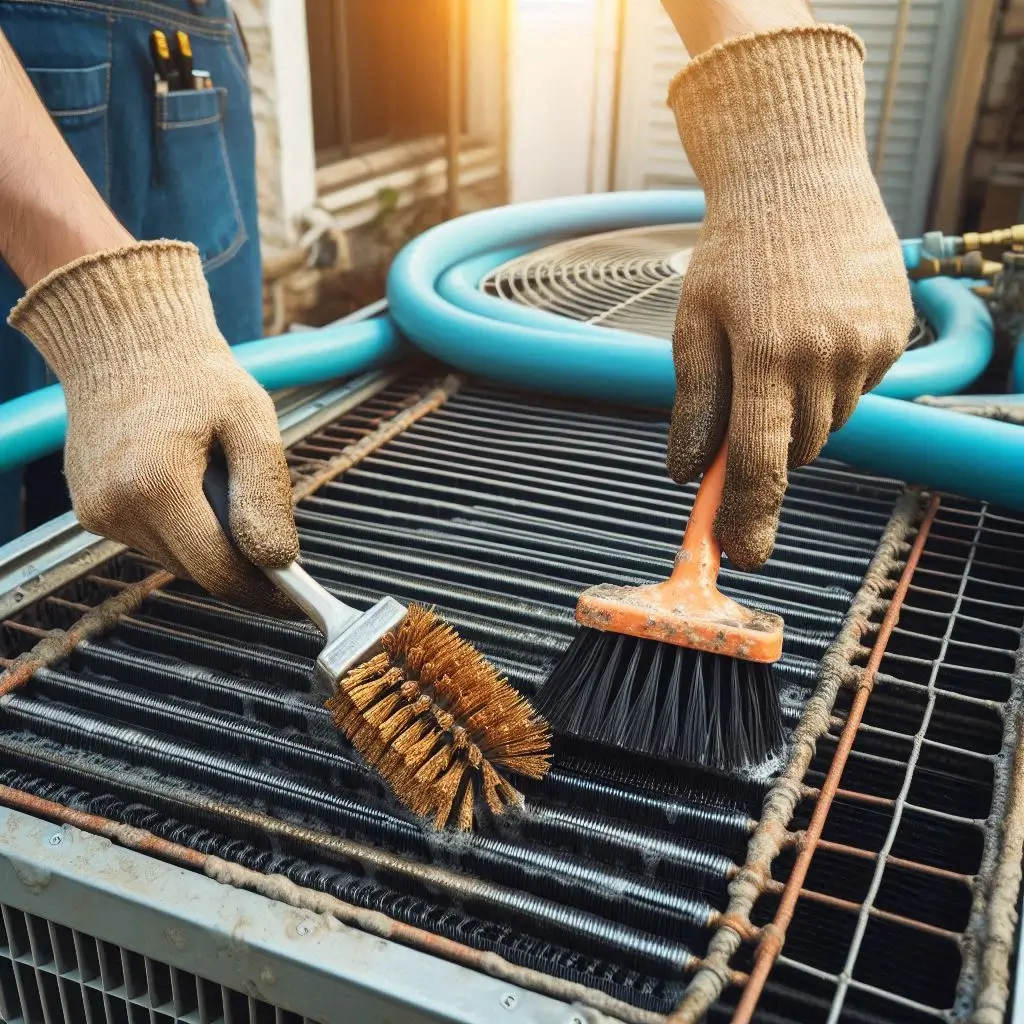
Professional Central Air Conditioner Repair Services
When your central air conditioner experiences issues, professional repair services ensure the system is fixed correctly and efficiently. While some troubleshooting can be done at home, certain problems require expert attention to prevent further damage and costly repairs.
This section covers when to call an HVAC technician, the importance of routine maintenance, and the factors that influence central air conditioner repair costs.
When to Call an HVAC Technician
While minor issues like adjusting thermostat settings or changing air filters can be handled at home, some problems require professional expertise. Ignoring serious AC problems can lead to system breakdowns and costly repairs.
Signs You Need Professional AC Repair:
- Persistent Warm Air: If your AC is blowing warm air even after adjusting the thermostat, there may be a refrigerant leak or compressor failure.
- Frequent Short Cycling: If the unit turns on and off frequently, this may indicate electrical control failure or an oversized system.
- Unusual Noises: Loud banging, screeching, or buzzing sounds often point to mechanical issues, such as loose parts or a failing motor.
- Leaking Water Around the Unit: Excessive moisture or refrigerant leaks can damage internal components and impact efficiency.
- High Energy Bills: A sudden spike in energy costs may indicate an overworked AC due to clogged coils, a failing compressor, or low refrigerant levels.
- Weak Airflow or Hot Spots: If some rooms remain hot while others cool down, there could be ductwork issues or a failing blower motor.
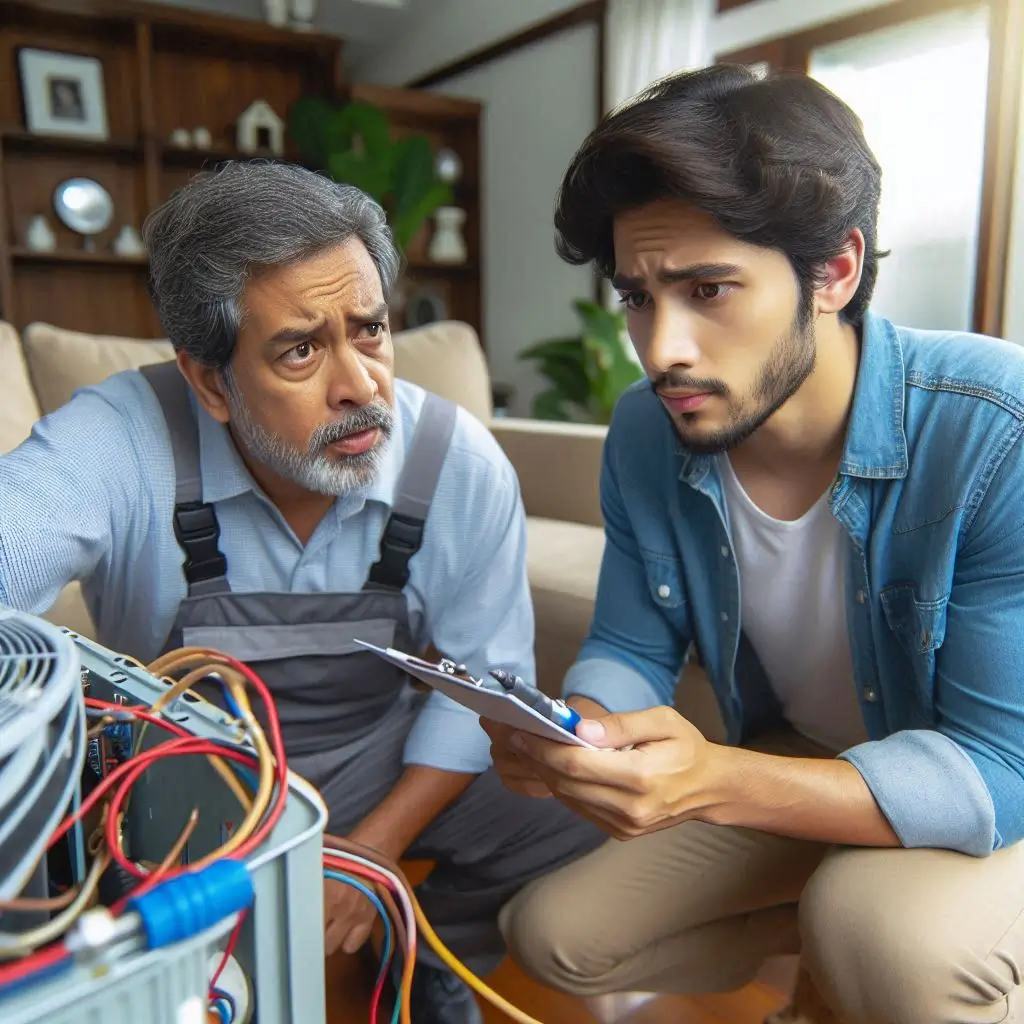
Importance of Routine Maintenance
Regular AC maintenance helps prevent breakdowns, improves efficiency, and extends the system’s lifespan. Investing in preventive care can save homeowners from costly emergency repairs.
Key Benefits of Routine Maintenance:
- Improved Energy Efficiency: Clean coils and unclogged filters ensure smooth airflow and optimal cooling.
- Fewer Repairs and Breakdowns: Regular tune-ups help detect minor issues before they turn into costly repairs.
- Extended System Lifespan: A well-maintained AC unit can last 15-20 years, compared to 10-12 years for neglected systems.
- Enhanced Indoor Air Quality: Clean filters and coils prevent dust, mold, and allergens from circulating in your home.
Essential AC Maintenance Tasks:
Filter Replacement: Replace air filters every 1-3 months to maintain good airflow.
Coil Cleaning: Dirt-covered coils reduce efficiency and should be cleaned regularly.
Refrigerant Level Check: Low refrigerant can cause poor cooling and compressor failure.
Thermostat Calibration: Ensure accurate temperature control and energy efficiency.
Duct Inspection: Leaks or blockages in ducts can cause uneven cooling and energy loss.
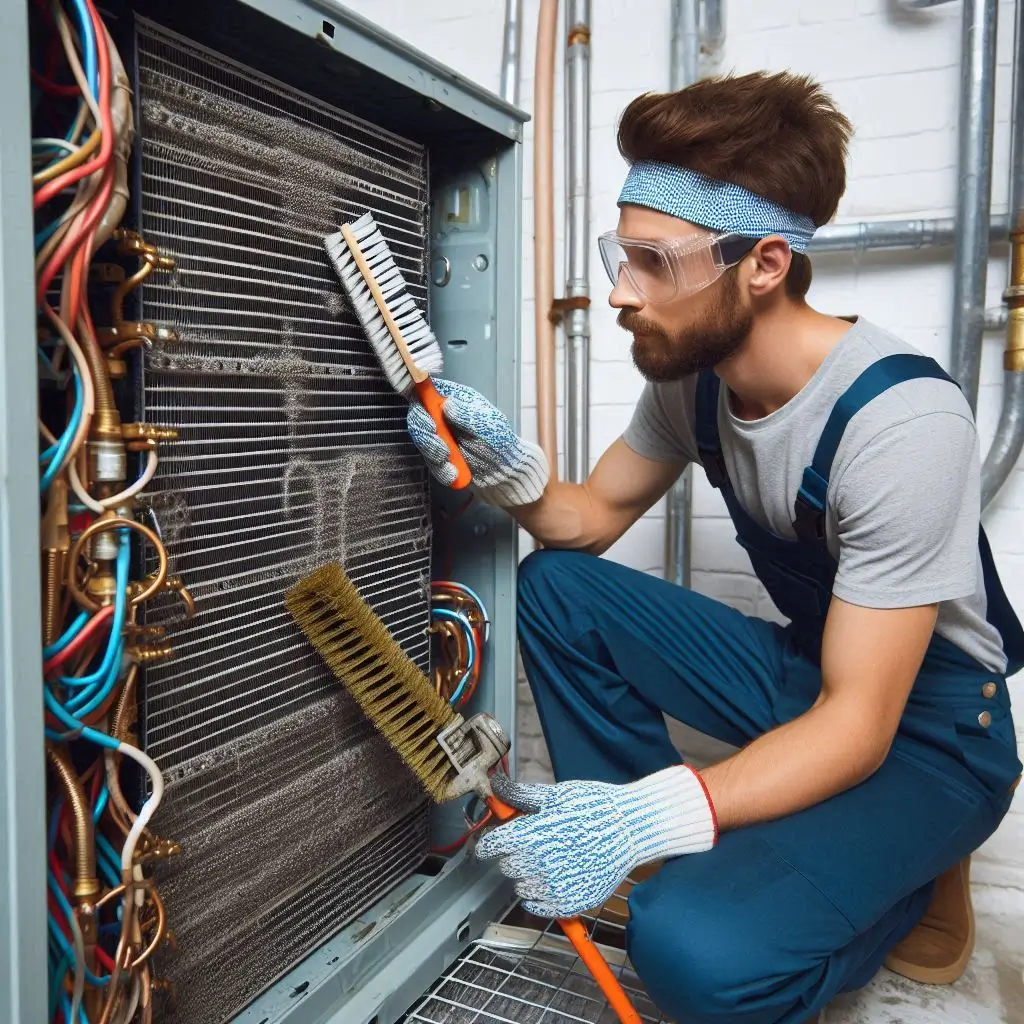
Cost Factors for Repairs
The cost of central air conditioner repair varies depending on the severity of the problem, the parts required, and labor charges. Understanding these factors can help homeowners budget for necessary repairs.
Factors That Influence AC Repair Costs:
-
Type of Repair Needed:
- Minor issues like thermostat recalibration or filter replacement cost around $75-$200.
- Major repairs, such as compressor replacement or refrigerant leaks, can cost $500-$2,000.
-
Age of the System:
- Older units (10+ years) may require more expensive parts or frequent repairs.
- If the system is too old, replacing it may be more cost-effective than constant repairs.
-
Brand and Model of the AC Unit:
- High-end or less common brands may have pricier replacement parts.
- Standard brands generally have more affordable and readily available components.
-
Labor Costs and Service Fees:
- HVAC professionals charge an hourly rate between $75-$150 per hour, depending on experience and location.
- Emergency services or after-hours repairs may incur higher fees.
-
Extent of Damage:
- Minor repairs, like capacitor replacement, cost $100-$250.
- Extensive damage requiring component replacements, such as the evaporator coil, can exceed $1,500.
-
Warranty Coverage:
- If your AC is under warranty, some repairs may be covered, significantly reducing out-of-pocket costs.
- Extended warranties may also provide additional cost savings.
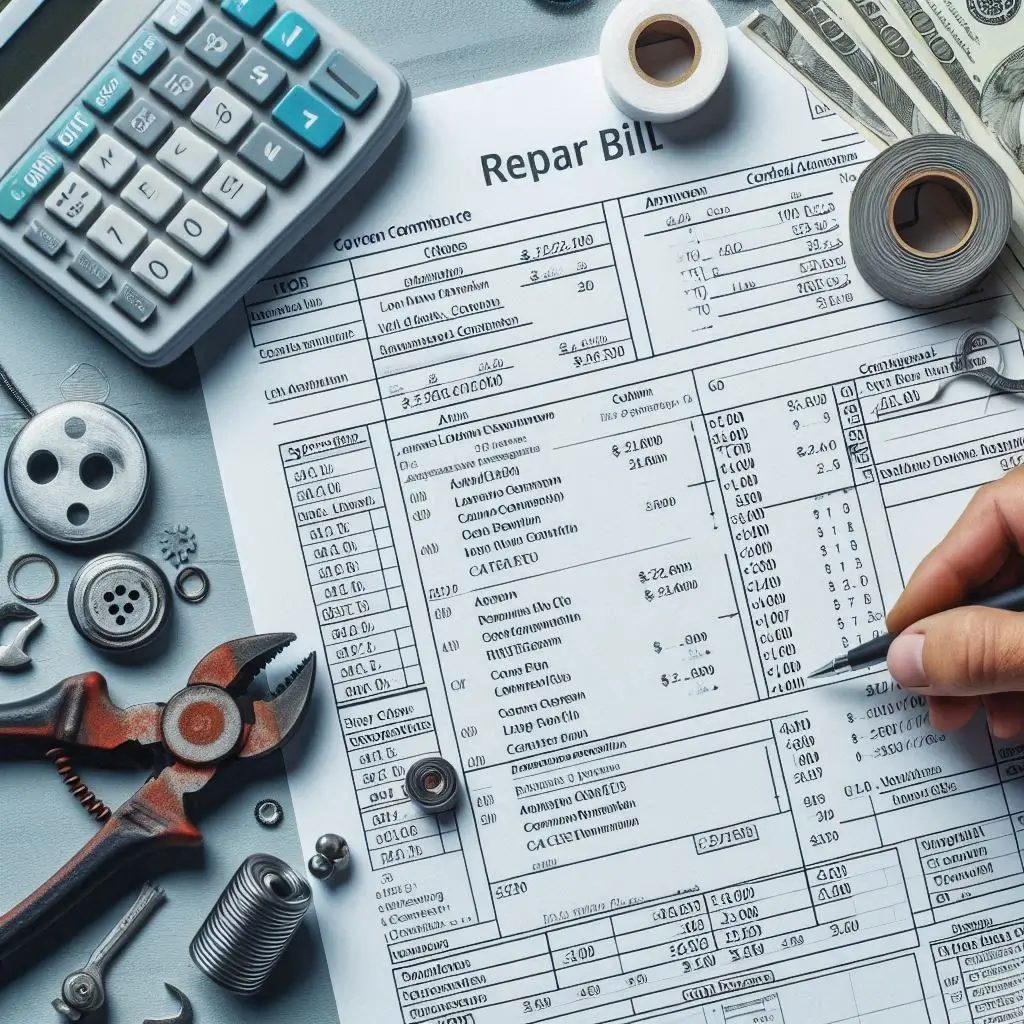
How to Prevent Future AC Repairs
Preventing costly AC repairs starts with proactive maintenance, regular inspections, and, when necessary, upgrading to a more energy-efficient system. A well-maintained air conditioner not only lasts longer but also performs more efficiently, reducing energy costs and improving indoor comfort.
In this section, we will discuss regular maintenance tips, the importance of seasonal AC inspections, and how upgrading to a more efficient system can help avoid future repairs.
Regular Maintenance Tips
Routine AC maintenance is crucial for keeping your unit in top shape and preventing unexpected breakdowns. Simple tasks like cleaning filters and checking refrigerant levels can go a long way in extending the life of your air conditioner.
Key Maintenance Tasks to Prevent AC Issues:
Change Air Filters Regularly
- Dirty filters restrict airflow, making your AC work harder. Replace them every 1-3 months for optimal efficiency.
Clean the Condenser Coils
- Outdoor condenser coils accumulate dirt and debris, reducing heat dissipation. Clean them with a soft brush or hose at least twice a year.
Check Refrigerant Levels
- Low refrigerant levels indicate leaks that need professional repair. Insufficient refrigerant can cause your AC to freeze up and stop cooling effectively.
Inspect the Ductwork for Leaks
- Leaky ducts waste cooled air, leading to uneven cooling and higher energy bills. Seal any leaks with professional-grade duct tape or insulation.
Lubricate Moving Parts
- Components like fan motors and bearings require lubrication to reduce friction and prevent wear and tear. This should be done annually during professional tune-ups.
Test the Thermostat
- Ensure the thermostat is functioning correctly and accurately controlling temperatures. Upgrade to a programmable or smart thermostat for better efficiency.
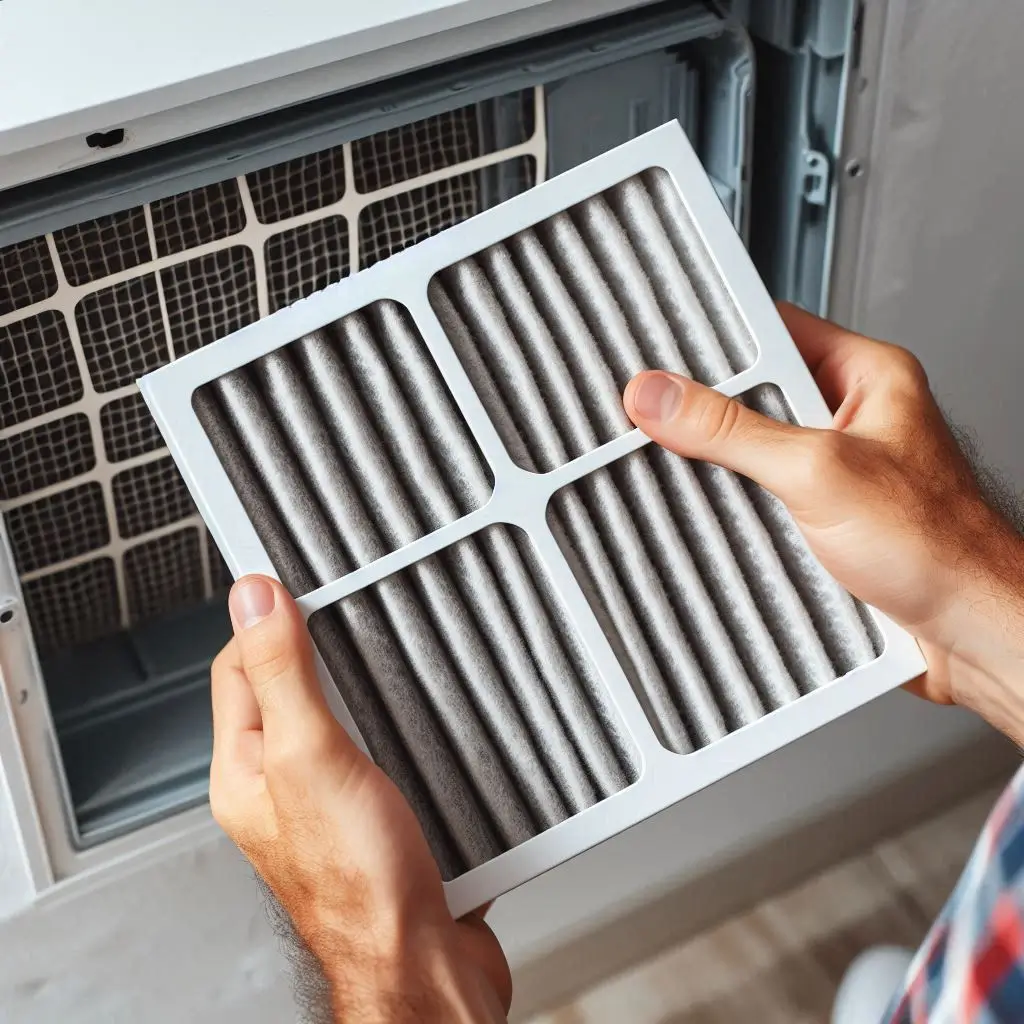
Seasonal AC Inspections
Seasonal inspections by a professional HVAC technician help detect minor issues before they become costly repairs. These inspections ensure your AC is ready for peak performance during the summer months.
Why Seasonal Inspections Matter:
-
Early Detection of Problems
- Technicians can spot issues like refrigerant leaks, failing capacitors, and worn-out components before they cause system failure.
-
Improved Energy Efficiency
- A well-maintained AC consumes 15-20% less energy, reducing monthly utility bills.
-
Extended Lifespan of the Unit
- Regular inspections prevent wear and tear, helping your system last 15-20 years instead of requiring early replacement.
Recommended Inspection Schedule:
📅 Spring Inspection: Prepares your AC for summer by checking refrigerant levels, cleaning coils, and testing electrical components.
📅 Fall Inspection: Ensures your HVAC system is winter-ready by inspecting airflow, ducts, and thermostats.
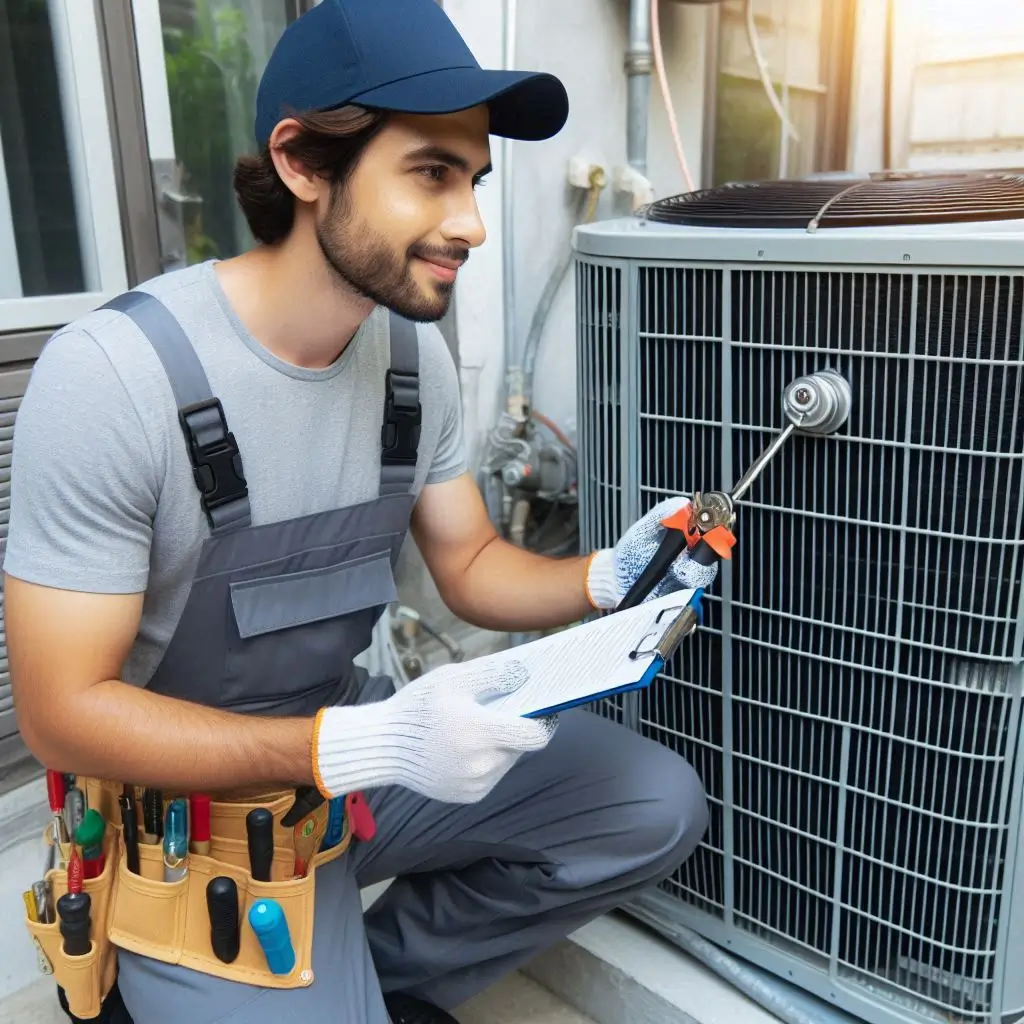
Upgrading to a More Efficient System
If your AC is more than 10-15 years old, frequent repairs and high energy bills may indicate it’s time for an upgrade. Newer energy-efficient models offer better cooling, lower maintenance needs, and significant cost savings.
Benefits of Upgrading to a High-Efficiency AC:
🔹 Lower Energy Bills
- Modern AC units with higher SEER ratings (Seasonal Energy Efficiency Ratio) use up to 30% less energy than older models.
🔹 Better Cooling Performance
- Advanced inverter technology and variable-speed compressors ensure consistent cooling without temperature fluctuations.
🔹 Smart Technology Integration
- Many new AC models are compatible with smart thermostats, allowing homeowners to control cooling remotely and automate temperature settings.
🔹 Reduced Environmental Impact
- Newer systems use eco-friendly refrigerants like R-410A, which have a lower carbon footprint than outdated refrigerants like R-22.
When Should You Replace Your AC?
- Your current system is over 15 years old and requires frequent repairs.
- Your AC struggles to maintain a comfortable temperature.
- You notice higher-than-normal energy bills.
- The cost of repairs exceeds 50% of the price of a new unit.
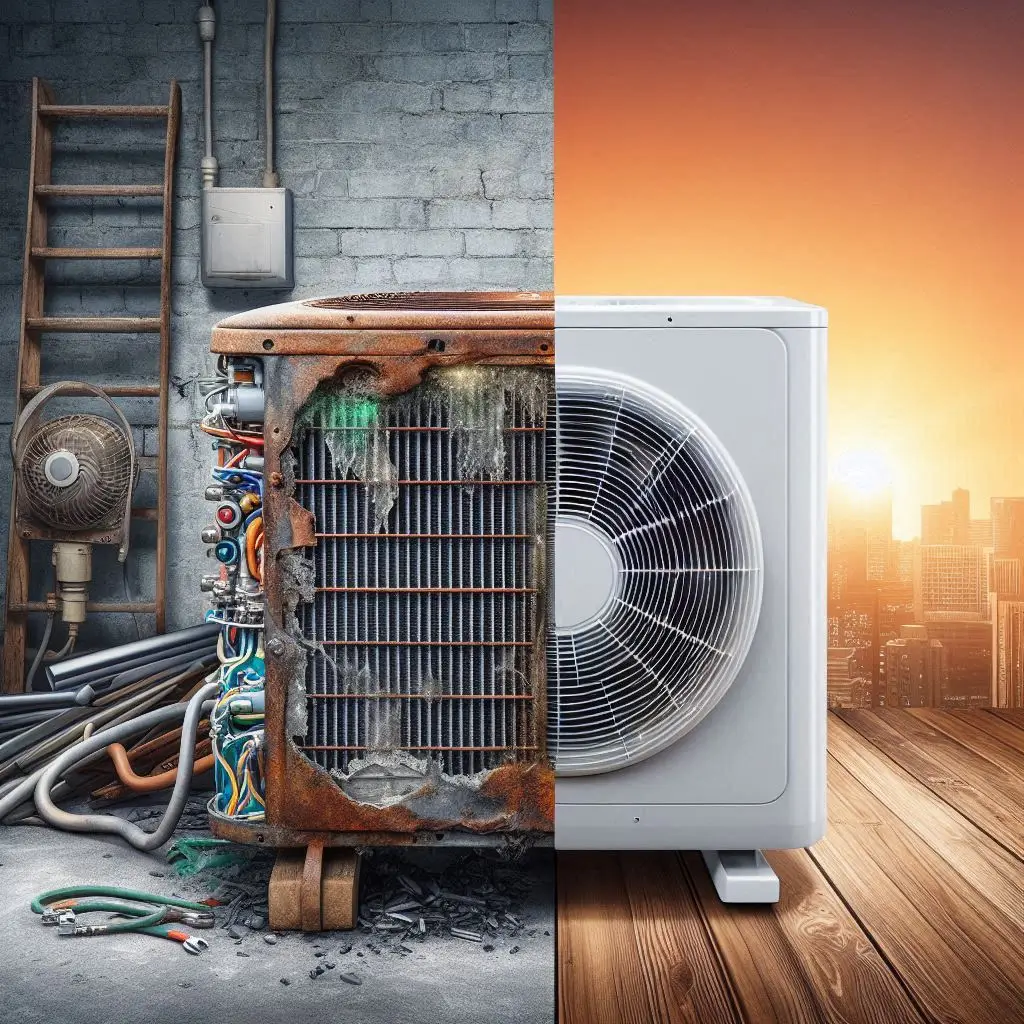
Frequently Asked Questions (FAQs) About Central Air Conditioner Repair
When it comes to central air conditioner repair, homeowners often have many questions regarding maintenance, troubleshooting, and repair costs. Below are some of the most common FAQs to help you better understand how to keep your AC running efficiently.
Q1: How Often Should I Service My Central Air Conditioner?
Answer:
Regular servicing is crucial for maintaining the efficiency and longevity of your AC unit. Experts recommend:
- Annual professional maintenance: Schedule a full inspection and tune-up before summer.
- Monthly DIY maintenance: Clean or replace air filters, check for unusual noises, and clear debris from around the outdoor unit.
Neglecting maintenance can lead to higher energy bills, frequent breakdowns, and reduced cooling performance.
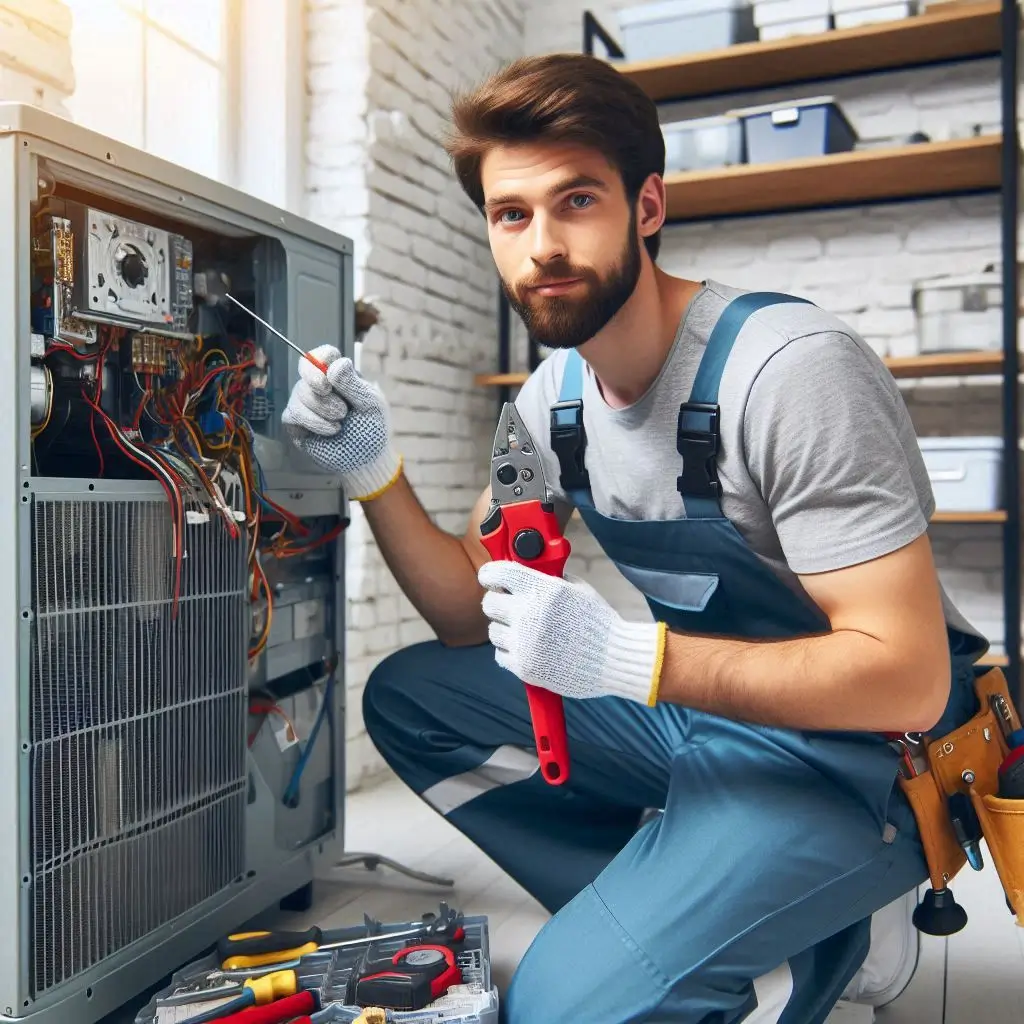
Q2: Why Is My Central AC Not Cooling Properly?
Answer:
If your air conditioner is running but not cooling effectively, possible causes include:
- Clogged air filters: Dirty filters block airflow, reducing cooling efficiency.
- Low refrigerant levels: A refrigerant leak can cause warm air to blow instead of cool air.
- Dirty condenser coils: Accumulated dirt prevents proper heat dissipation.
- Thermostat issues: Incorrect settings or a faulty thermostat may be the culprit.
To fix this, start with basic troubleshooting, such as checking the thermostat settings, cleaning the air filter, and inspecting the outdoor unit for obstructions. If the issue persists, contact a professional.
Q3: What Are the Signs That My AC Needs Repair?
Answer:
Your AC unit may need repair if you notice:
- Unusual noises (banging, buzzing, or clicking)
- Weak airflow or uneven cooling in different rooms
- Strange odors coming from the vents
- High energy bills despite normal AC usage
- Frequent cycling (turning on and off too often)
Ignoring these warning signs can lead to costly breakdowns. If your AC exhibits any of these issues, schedule a professional inspection immediately.
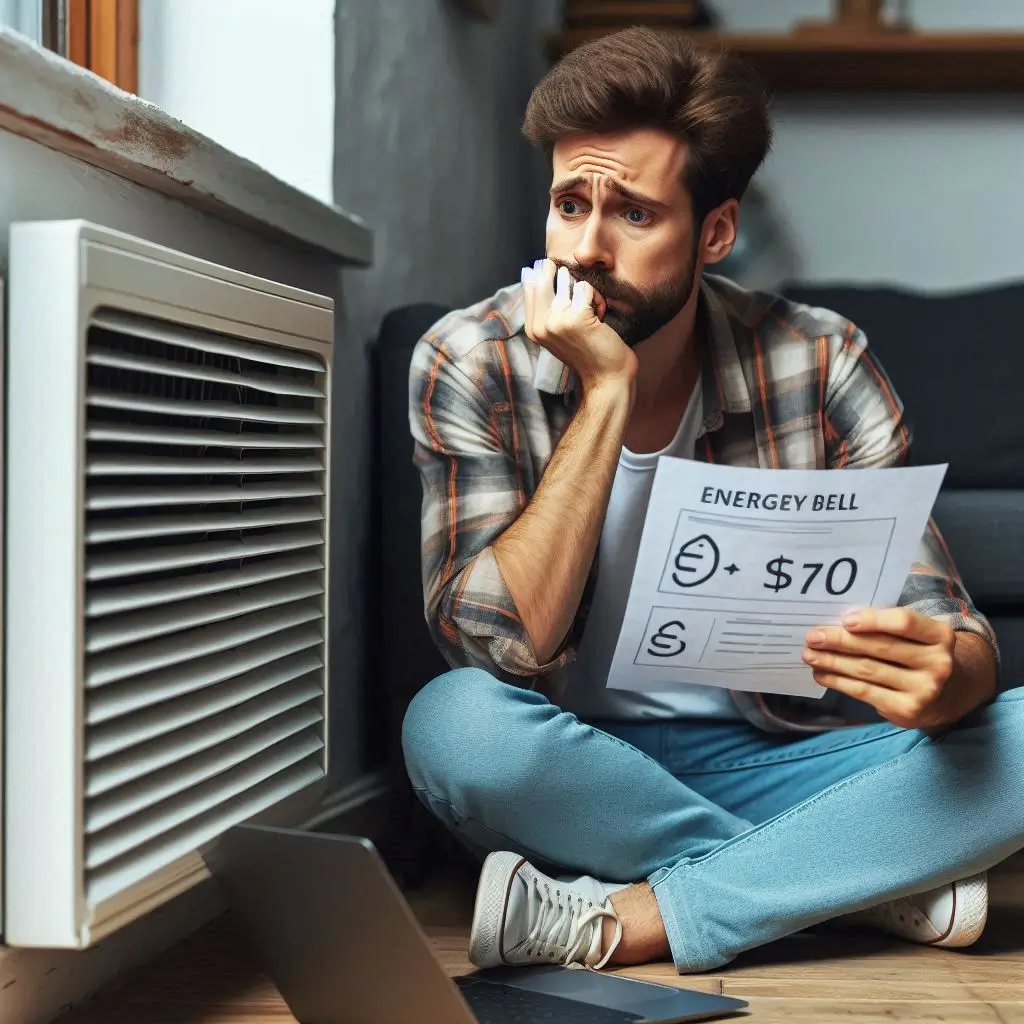
Q4: How Much Does It Cost to Repair a Central Air Conditioner?
Answer:
Repair costs vary depending on the problem. Here’s an estimated breakdown:
- Refrigerant Leak Repair: $200 – $1,500
- Compressor Repair/Replacement: $1,000 – $2,500
- Thermostat Replacement: $100 – $300
- Blower Motor Repair: $150 – $700
- Electrical Issues: $100 – $500
To avoid expensive repairs, invest in regular maintenance and early problem detection. If your AC is over 15 years old and requires frequent repairs, replacing it with a new energy-efficient model may be more cost-effective.
Q5: Can I Repair My Central AC Myself, or Should I Call a Professional?
Answer:
Some minor AC issues can be resolved with DIY maintenance, such as:
- Changing air filters
- Cleaning condenser coils
- Checking thermostat settings
However, major repairs like refrigerant leaks, compressor issues, and electrical malfunctions require professional expertise. Attempting DIY repairs on these components can void warranties and lead to further damage.
When in doubt, always call a licensed HVAC technician for professional assessment and repair.
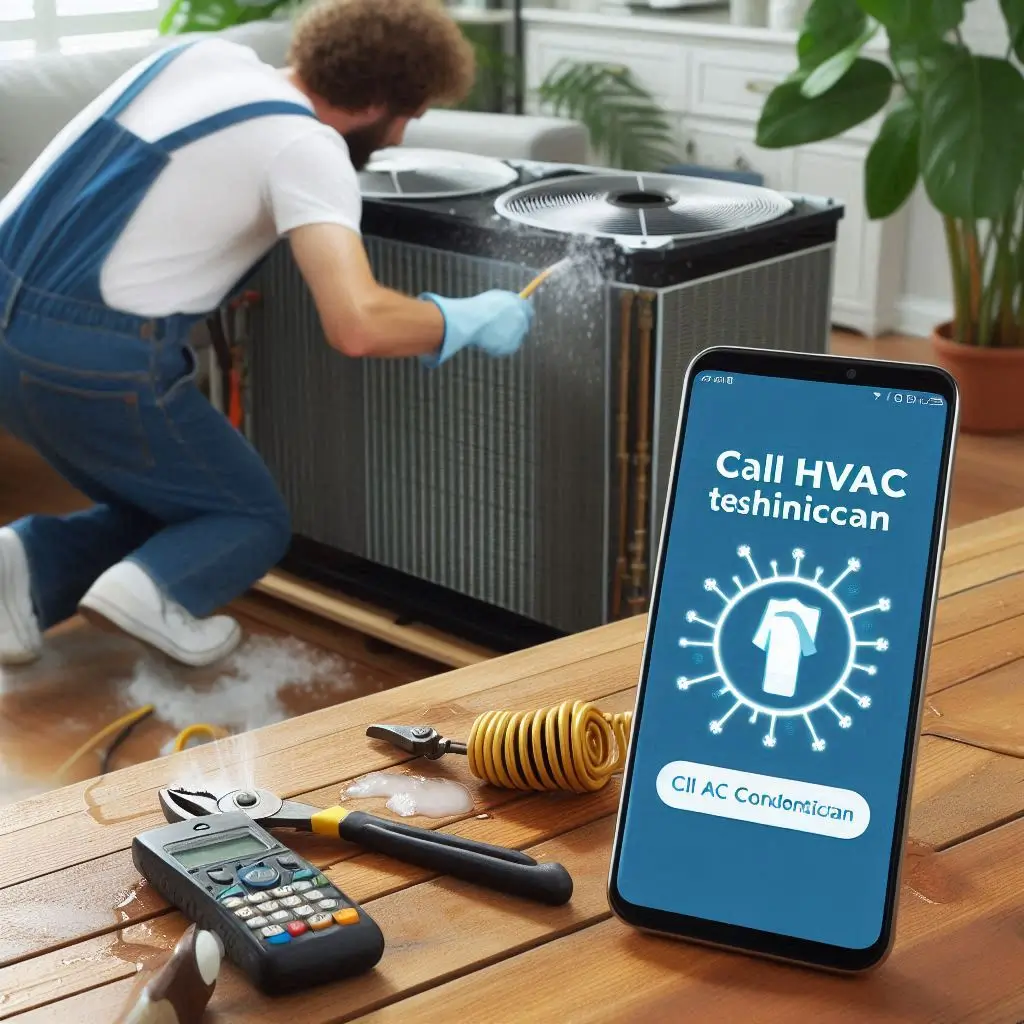
Conclusion
Ensuring your central air conditioner remains in peak condition requires a combination of regular maintenance, timely repairs, and professional servicing. By understanding common AC problems, recognizing early warning signs, and taking proactive steps like seasonal inspections and filter replacements, you can extend your unit’s lifespan and improve energy efficiency. While minor troubleshooting can be done at home, serious issues such as refrigerant leaks or electrical malfunctions should always be handled by a licensed HVAC technician. Investing in routine maintenance not only prevents costly breakdowns but also ensures your home stays cool and comfortable year-round. If your AC is experiencing issues, don’t wait—schedule a professional central air conditioner repair service today to restore optimal performance.

